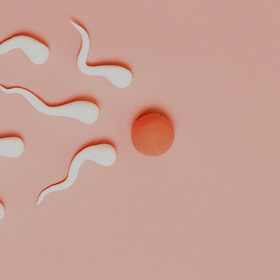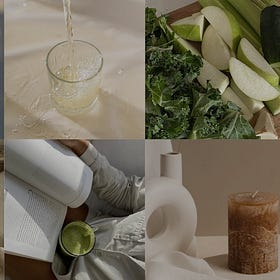Here's What I Would Do If I Was Trying To Get Pregnant This Year
which I'm not...but if I were...
Hi beautiful,
So at 28, I’m at a point in my life where my friends are getting married and thinking about children. And as someone who works in the hormone and fertility space, that means I quickly become the go to person for all questions around TTC (“trying to conceive”).
So rather than answering it in piecemeal, I figured I’d break it all down for you.
If I were trying to get pregnant this year, here is my list of things I would do to best prepare my body, my hormones, and my mind for the journey ahead.
We’re going to be breaking it down step by step, but for those of you that want the quick and dirty, here’s the list:
Take 3-6 months to myself without trying to conceive
Start a high quality prenatal
Eat wild, fatty fish 2-3 x week
Do a lil liver loving
Be mindful of my chemical use
Breathwork every morning
Consider eating liver
Get to know my ovulation
Connect with my partner outside of just baby-making
Get hormonal blood work done
1. GIVE MYSELF 3-6 MONTHS TO PREP
This is a big one. I actually recommend that all my clients try to take at least 3 months to simply focus on supporting their body. This gives you the time, space and grace to support your hormones, digestion, nutrient stores, etc. WITHOUT worrying about getting pregnant.
Think of it as a prep phase - a time that is just about you and helping you to feel your best before supporting another life and body.
Many clients come to me because they want to conceive but have an irregular cycle, aren’t ovulating, or are just getting off of birth control. And it can be very stressful to try and tackle these things while *actively* thinking about trying to get pregnant. Instead, give yourself some TIME to just work on these things, bring your body into balance, and support your hormones BEFORE trying to get pregnant.
THIS IS ESPECIALLY IMPORTANT IF YOU ARE COMING OFF OF BIRTH CONTROL - birth control depletes the body of many nutrients that need to be restored to help support a healthy cycle and fertility. And it takes about 3 months to build up these nutrient stores.
2. START A HIGH QUALITY PRENATAL VITAMIN
Extra points if you start this in that 3-6 month prep phase (which is what I recommend).
The body requires extra vitamins and minerals to support fertility, ovulation and early pregnant. As such, we like to look at a high quality prenatal as a safety net…it’s not meant to *replace* a high quality diet, but it is meant to come in and act as an insurance policy.
Let’s put it this way….
over 90% of Americans do not reach their vegetable intake…
and since we get so many vitamins (like folate (vitamin B9), vitamin C, etc) from veggies , it is safe to assume that most of us may be falling short of this vitamin. And these vitamins are CRUCIAL for ovulation, egg quality, and early pregnancy. So go eat those greens! But also take a high quality multi just in case.
“okay Amanda, but I eat tons of fruits and veggies and have a balanced diet…do I really need a prenatal”
I hear you. I consider myself to do the same.
And yet, if I was TTC, I would be taking a prenatal vitamin (in fact, I actually take one right now anyway…).
And that’s because even with a well-balanced diet, we have so. many. factors. working against us.
From depleted soil to medications, it has become increasingly hard to meet our needs from food alone.
Here’s a checklist to see whether a prenatal vitamin makes sense for you…
Have you been on hormonal birth control? if yes….take a prenatal
Or you vegetarian or vegan? if yes…take a prenatal
Do you have dietary intolerances or allergies? if yes…take a prenatal
Do you smoke, drink alcohol, or have a hx of substances? if yes…take a prenatal
Do you have a hx of an eating disorder? if yes…take a prenatal
Do you have issues with malabsorption (SIBO, IBS, etc)? if yes…take a prenatal
Have you used medications or antibiotics? if yes…take a prenatal
So I see that this is most women.
So what are the best prenatal vitamins on the market? again, which you take depends on you, but here is a quick list of my favs…
FullWell - 8 pills- use code Rootstoleaves for 10% off
Perelel - 6 pills
Needed - 3 or 8 pills depending
Tend - snack bar - use code Rootstoleaves for 10%
Seeking Health - 3 or 8 pills
or check out my Fullscript for discounted supplement recs
3. EAT WILD, FATTY FISH 2-3 X WEEK
Fish is so important for fertility. The omega-3 content, a type of fat, helps to reduce inflammation and support egg quality. For this reason, many practitioners will recommend fish oil pills…but fish oil doesn’t contain all the other benefits that fish does! So if possible, we’re looking to include whole, wild fish sources.
Outside of just omega-3s, fish contains iodine, protein, and even some calcium, alllllll of which will support the body, hormones and fertility.
So how much fish? We’re looking at 2-3 servings of fish x week. 1 servings = ~4 oz (or the size of your palm).
The best fish for fertility?
Salmon (wild please!)
Trout
Sardines
Anchovies
Shrimp
Bivalves in general (oysters, clams, etc)
4. DO A LIL LIVER LOVING
OOoooOh the liver. Our detoxification organ. The one that helps us digest, remove toxins, and helps us recover from our less than ideal choices (like after a night out with your college friends).
The liver is key is regulating our hormones, especially one called estrogen that can otherwise go a lil haywire. When our liver isn’t functioning properly, it can lead to a bit of a back up of estrogen. This can lead to missed or skipped ovulation, breakouts, irregular cycles, and so on.
So how do we support our liver…
Try bitters before meals
Include bitter foods (think arugula, radicchio, etc)
Abstain from OTC medicine (unless necessary)
Limit alcohol (ideally, nix it completely)
Try a castor oil pack (Queen of Thrones is the goat)
Consider liver support herbs like milk thistle or dandelion root
5. BE MINDFUL OF CHEMICAL USE
We’ll dedicate a whole other post to chemicals and endocrine disruption, but for now, here is the takeaway.
Chemicals, found in everything from plastics to our food supply, can interfere with our hormone production and lead to issues like abnormal egg quality, missed ovulation and irregular cycles.
Other chemicals, even if not considered an EDC, can still impact egg quality and/or early pregnancy, making a quick no on my list.
So if I was TTC, I’d spend a good amount of time being really mindful of my chemical use to optimize my eggs and my fertility picture.
Now, we don’t have to go crazy, but there are a few no-brainers that I like to suggest my clients limit when TTC. These include…
BPA found in canned foods (no canned tomato sauce please!)
Phthalates found in plastic water bottles
Parabens found in cosmetic products
“Fragrances” like in scented candles
Retinol (not pregnancy safe)
Smoking
6. BREATHWORK VERY MORNING
Stress can directly impact your fertility status.
Read that again.
Stress can directly impact your fertility status.
We know that the female body is driven by reproduction. From this perspective, things that put stress on the body has the potential to shut down ovulation, prioritizing our stress hormones over our reproductive hormones.
Now with that, we know that TTC can bring about stress on its own. So I recommend that women really take the time to carve out a practice that helps to reduce stress, calm the mind, and foster self connection before getting pregnant or going down the TTC journey.
I find pranayama practices (aka “breathwork”) to be an effective way to do this. While there are many potential practices, I find sama vritti to be an accessible one to start with.
your morning breathwork ritual
sit in a comfortable position
close your eyes, and slowly tune into your natural inhale and exhale for several rounds of breath
now inhale through the nose to the count of 1-2-3-4, filling the belly up with air
exhale through the nose to the count of 1-2-3-4, navel pulling in
continue for 5-10 minutes
7. CONSIDER EATING LIVER
I know, this isn’t a super popular one. But liver is actually quite the super food.
Liver is a premium food source of vitamins that are key for fertility, including folate, A, C and E, along with antioxidants like CoQ10, and minerals like zinc. The best part? a little goes a looonnnggg way
Just 3.5 ounces a week of liver (about the size of your palm) can do wonders for your fertility and hormones.
As someone who does not eat meat, my consideration of liver if TTC just goes to show what a superfood this can be.
Now, I get it - you may not be open to this dish (a lot of my clients weren’t at first either…) so let’s talk my fav way to make it more palatable. And that is
✨HIDDEN LIVER✨
Hidden liver refers to products that blend in organ meats so that their taste is masked. My favorite retailer for hidden liver products is Force of Nature Meats, where they blend grass fed meat with grass fed organ meat.
Now, some people will take liver supplements, but this really isn’t my fav way. Not only are the capsules much more expensive, but you also need to take about 6 capsules x day, on top of your prenatal, which can quickly become a long list of pills.
For more information on liver, its benefits, and even its role in pregnancy, I defer to the expert, Lily Nichols.
8. GET TO KNOW MY OVULATION
Now, for newly TTC clients, we don’t want you going crazy or overly focused on ovulation. This can quickly become stressful.
That being said, I do recommend getting to know your cycle, and with that ovulation.
For those that don’t know ovulation refers to the time in your cycle when your egg is released from your ovary. It occurs 1 x month and marks the period of time when you are able to get pregnant.
Most women don’t realize you can only get pregnant ~5 days in your cycle. While ovulation is only 1 event on 1 day, since sperm can survive for several days, the fertile window is considered to be 3-5 days prior to ovulation and 1-2 days post ovulation. So this is why it becomes so important to understand your cycle.
Without a deeper understanding of your body and your hormones, when first TTC is can feel a bit overwhelming. Instead, take some time to get to know yourself.
Here are my fav ways to get to know your ovulation…
Take note of how long your cycle usually is (this is the length of time from the start of your period until your next period). Then find the middle point. This is your estimated ovulation period.
Ex: 28 day cycle —> ovulation would be estimated for around day 14
Once you know your estimated date, start to take note of how you feel around that time. Due to changing hormones, most women might feel more energized, a higher libido, less fatigue, lower appetite. Start to see if you can notice a pattern around ovulation.
Check your cervical mucus. Right before and during ovulation, you usually have the most cervical mucus. It is clear and stretchy and slippery.
Consider your basal body temperature (BBT). Before ovulation, a women’s BBT is lower, and after ovulation is rises up. By tracking your BBT every morning, you can start to see the changes in temperature and better understand your ovulation. (note, you need a BBT thermometer to do this, not a run of the mill one)
9. CONNECT WITH MY PARTNER
Finally, this is key! When TTC, it can become easy to get mechanical about it. To make it goal oriented. And with that, to have stress coming in.
For me, it would be essential to remember that this is about creating and expanding a family from a place of love and connection. And as such, that should be at the forefront.
Connecting with my partner, both with intimacy, fun, joy, friendship, and everything in between, would be an important part of this journey for me.
And I’ve seen with my clients what an impact it can have on their emotional and physical health as well.
10. GET BLOOD WORK DONE
Because knowledge is power.
I see too often that the issues behind my clients TTC journey were due to poor thyroid status or low estrogen/progesterone etc.
Getting blood work done gives you the information you need to know where to focus your efforts.
Talk to your OBGYN about getting the below tested (there’s a much longer list, but here is the minimum I tend to recommend, especially if facing fertility challenges)
Vitamin D
Vitamin B12
Folate and/or homocysteine
Iron panel
Lipid panel
Thyroid panel
Hormones:
Estrogen (on day 3 and day 21 of your cycle)
Progesterone (on day 21 of your cycle)
LH and FSH (follicular phase)
Testosterone
DHEA-S
Potentially SHBG and Prolactin
I got into this and a lil more below as well 👇
In closing ~
embarking on the journey of trying to conceive is a profound and transformative chapter in one's life.
As you contemplate the steps to support your fertility, remember that this process is not just about achieving a positive pregnancy test; it's a holistic endeavor that involves nurturing your body, mind, and expression of love.
Wishing you strength, resilience, and a harmonious path as you step into the exciting realm of trying to conceive.
May this chapter be filled with joy, love, and the fulfillment of your deepest aspirations.
Written while snacking on a TEND bar,








